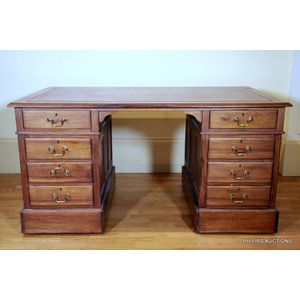Midcentury Partner Desk with Leather Top and Brass Handles
You must be a subscriber, and be logged in to view price and dealer details.
Subscribe Now to view actual auction price for this item
When you subscribe, you have the option of setting the currency in which to display prices to $Au, $US, $NZ or Stg.
- Blind Tooling / Blind Tooled - Blind tooling is a technique used in the decoration of leather goods such as book covers, belts, and wallets. It involves the use of specialized tools to impress designs and patterns onto the surface of the leather without the use of added colour.
The process involves the use of a variety of tools, including stamps, embossing tools, and finishing tools, which are used to create various textures and patterns on the leather surface. The tools are heated, and then pressed onto the leather, leaving an impression. The tools can be used to create designs that are simple or complex, with a variety of textures and patterns, including geometric shapes, florals, or scenes. The leather is then burnished to enhance the design and give it a smooth finish. - Plinth - The square or rectangular base of a piece of cabinet furniture, often ornamented with moulding. The plinth may be separate, as in some wardrobes or presses, and act as the support for the carcase. In a false plinth, the moulded boards may be attached directly to the piece. Furniture with a plinth base usually does not have separate feet. The term derives from architecture where it denotes the base of a column or statue.
- Pedestal - The columns that support many dining tables and most small occasional tables. They are usually turned, though octagonal-shaped pedestals were fashionable during the 1830s and 1840s.
- Tooled - Decoration of a leather surface, usually by stamping the surface with a heated punch or wheel containing foliate or geometric designs. In blind tooling the surface of the punch or wheel is in direct contact with the leather, while in gold tooling, a ribbon of gold leaf is placed between the punch or wheel and the leather, and once they have been applied, the excess gold is brushed off, leaving only the design.
Visually similar items

A fine walnut partners desk, mid 1940s. The double pedestal desk with four cockbeaded drawers and cast swing handles, cupboards to the reverse long side and raised on an Art Deco waisted plinth base, with a bevel glazed top. Provenance: The property of the

A Victorian mahogany pedestal desk, retailed by James Shoolbred & Co., London (stamped and labelled), 1880s, the rectangular top with original gilt-tooled leather writing surface above three frieze drawers and a pair of pedestals, each with three drawers,

An American mahogany twin pedestal desk, circa 1920, with a tooled green leather writing plane above two pedestals, one with a set of four drawers and the other with a drawer above a cupboard, all with various compartments and partitions, another cupboard

A large mahogany twin pedestal partners desk, circa 1860, with a tooled green leather writing plane above two pedestals each with four drawers with brass escutcheons conforming to the recessed hinge style handles, and to the rear two keyed cupboards each w
